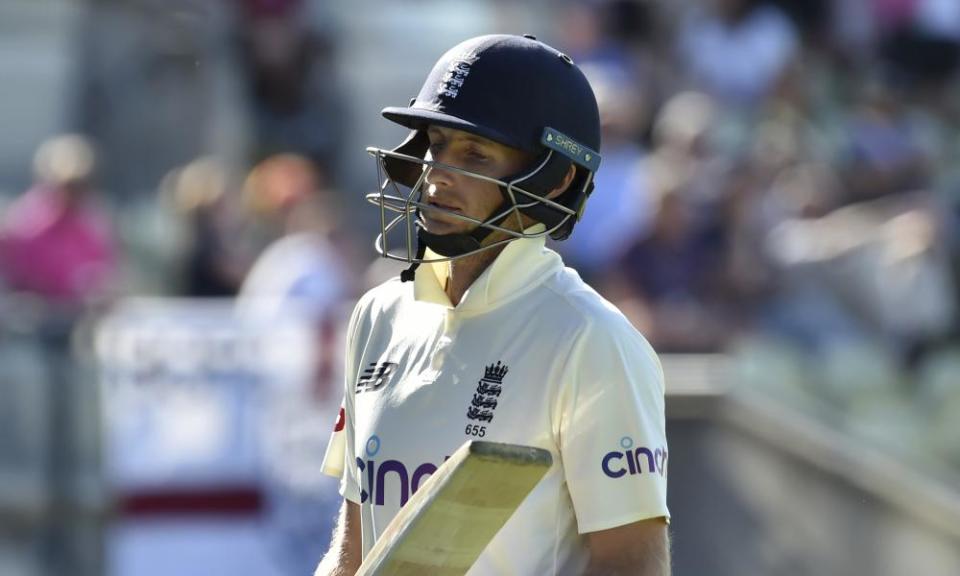England on brink of defeat as Neil Wagner turns the screw for New Zealand

Bataclysm. Batastrophe. There is simply not a hole this England lineup cannot bat itself into. If nothing else, they are experts in turning a crack into a crater, a tiny cut into a full-blown chasm. And on a sun-kissed Saturday afternoon at Edgbaston they donned gloves, strapped on pads and took themselves caverning.
New Zealand, for all that they had dominated the match, led by a demure 85 at the end of their first innings. Somehow, beyond all reason, England were in this game: all they needed was a decent opening partnership and they would be on their way. The innings break was the most enjoyable 10 minutes of the day for them, a time when the sun shone, all was calm and the future was plump with potential.
Related: Second string Kiwis make England look second-rate
Then England sent in their diggers. Rory Burns might as well have come out carrying a shovel, nicking the second delivery of the innings to second slip where Tom Latham took an excellent low catch (the tourists’ slip fielding being one of the areas where they have emphatically outclassed their hosts). Dom Sibley followed soon after, edging Matt Henry to Daryl Mitchell, another catch in the cordon. Zak Crawley’s score of 17 was more than eight times bigger than the best of his three previous knocks in the series and contained a couple of nice shots – the best a straight drive off Henry – but was ended with a very clear lbw, which at least made a change from the usual wild drives and heavy nicks.
Ollie Pope has been England’s one truly consistent batsman – four innings this series with a lowest score of 19 and a high of 23, set here before he was trapped lbw by Neil Wagner. Take away the 23-year-old’s runs and in this series England’s top six have nine single-digit scores against 10 double-digit ones. James Bracey, the subject of wild ironic cheering when he claimed his first Test run in his third innings, gloved the ball into his stumps attempting to reverse sweep Ajaz Patel. And finally Joe Root, the team’s one batsman of undisputed class, got stuck in a rut and could not find his way out, eventually top-edging Patel into the gloves of Tom Blundell for a painstaking 61-ball 11.
The bowling, particularly from Henry and the brilliantly expressive and committed Wagner, was good. But on a flat pitch these were disasters of England’s own making, a point proved by Mark Wood, who top-scored with a carefree 29 before skying a pull that eventually fell to Blundell. England clung on to the close at 122 for nine, ahead by 37 runs.
Batting was, of course, just one facet of a veritable emerald-cut diamond of failure for England in this game. Badly as they batted in the early evening they were almost as poor with the ball in the morning, a case of the agony and the actually-also-agony.

There was a moment, an hour into the day, when the call for drinks seemed to take the England dressing room completely by surprise, and it summed up their efforts in the opening session that they could not even get their beverages organised. From the start the bowling was ordinary, the fielding poor, the wicket-keeping sometimes shambolic. New Zealand scored 63 runs in 13 and a half overs before drinks, of which Ross Taylor, dropped by the substitute fielder Sam Billings on the way, got 34 with his partner, Henry Nicholls, only narrowly outscoring extras, 16-13. Three balls later, midway through Olly Stone’s first over of the day, Taylor was out.
Related: England v New Zealand: second Test, day three – as it happened
The 37-year-old played beautifully on the game’s third morning, judiciously taking on the short ball (except for that drop) and becoming the fifth batsman in this match to reach 80. None, curiously, has made it to 83. Stone’s reaction after Taylor nicked through to Bracey was that of a player fired up, aware that with none of England’s other bowlers making any headway this was a day he could make his own. Three balls later he should have got another, only for Bracey to dive beyond the ball, which hit his wrist on its way down.
Before the series started once Ben Foakes had been ruled out through injury to leave him holding the gloves, Bracey admitted he “didn’t really have it on my radar to be there as keeper”. It is not the only time his radar has been faulty. He is a young batsman still learning the wicket-keeping trade, a once-square peg rammed into a round hole before anyone has quite whittled away the corners, and batting out of position while he does it. But his first experience in the Test spotlight has been unpleasantly exposing.
Nicholls was out shortly before lunch, clobbered on the helmet by a Wood bouncer before, after a change of headgear and a once-over from the physio, nicking the next ball. Even so New Zealand went into the break with a 23-run lead and five wickets in hand, threatening to bat England out of the game.
But over the following 90 minutes, without any individual bowler putting together a spell of sustained excellence, wickets kept falling. Each of England’s seamers got at least one, with Daryl Mitchell slamming a pull straight to Crawley, the pick of England’s fielders, off Stone. Jimmy Anderson bowled Wagner off his pads, Wood trapped Henry lbw and Stuart Broad mopped up the last two, with Patel last man out after an entertaining partnership of 27 off 21 deliveries with Trent Boult.
England were back in the game. The sun was shining, all was calm, and the future was plump with potential. What could possibly go wrong?

 Yahoo Finance
Yahoo Finance 